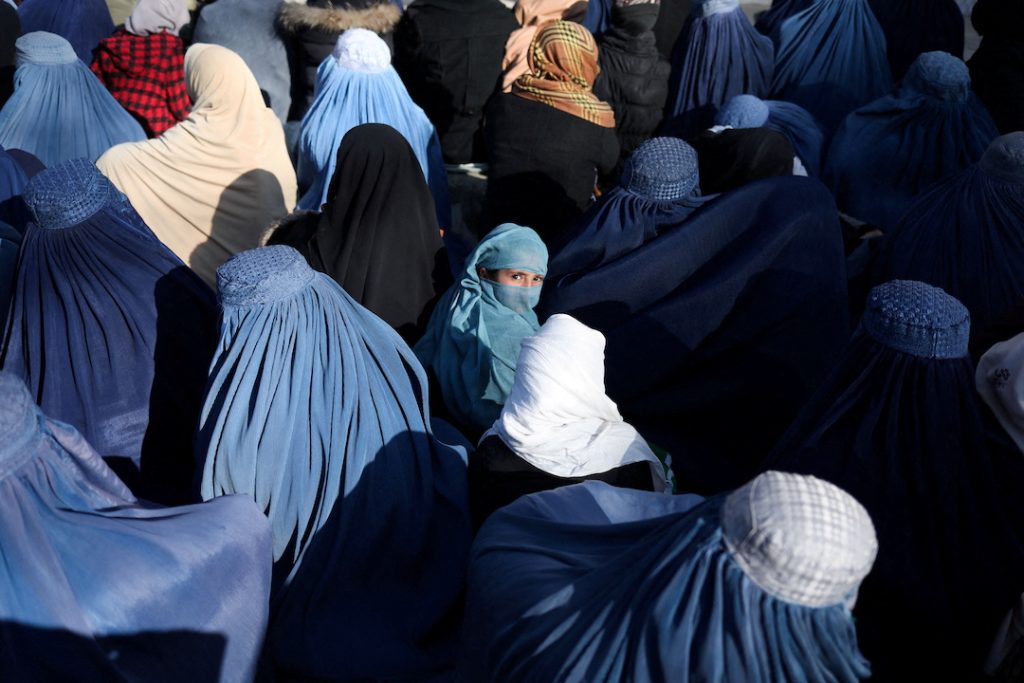The Taliban has introduced new laws in Afghanistan aimed at “promoting good and eliminating evil.” Under these rules, women are banned from speaking loudly in public or showing their faces outside their homes. The United Nations has condemned these so-called “virtue sanctions” and raised concerns over their impact on Afghan society.
A top UN official described the laws as a “disturbing vision for Afghanistan’s future.” The supreme leader of the Taliban, Hibatullah Akhundzada, has endorsed these rules. The Ministry of Virtue and Prevention emphasized that everyone in the country must follow these new laws. The Taliban’s morality police are now empowered to monitor how people dress, behave in public, and even what they eat or drink.
New Restrictions on Women
Women face severe restrictions under the new laws. The laws declare that a woman’s voice is “bad” and must be covered in public. Whenever a woman leaves her home, she must cover her voice, face, and body. These requirements are based on the Taliban’s interpretation of Sharia law, rooted in a 2022 decree by the Taliban’s supreme leader.
Key Restrictions for Women:
- Women must cover their entire bodies, including their faces, to prevent “temptation.”
- A woman’s voice is considered ‘Awrah’ and must not be heard in public. ‘Awrah’ refers to parts of the body that must be covered.
- Women are prohibited from singing or reading aloud, even within their homes.
- Clothing for women should not be thin, short, or tight.
- Women must cover themselves from men who are not their blood relatives.
- Men are also forbidden to look at women, and women are barred from looking at men.
New Restrictions on Men
Men are also subject to these moral laws. They must cover their bodies from the navel to the knees when outside their homes. This area is considered ‘Awrah.’ Men are not allowed to style their hair in ways that violate Sharia law. The Taliban has banned barbers in several provinces from shaving or trimming beards. Under the new rules, beards must be at least a fist-length long. Men’s ties are also banned.
The Role of the Ombudsmen
Ombudsmen are responsible for enforcing these laws across all provinces. They monitor compliance and have the authority to silence women’s voices or music coming from homes and to order men to shave or cut their hair according to the law. They can stop taxi drivers from giving rides to women who are not accompanied by a close male relative or who do not wear a hijab.
Prohibition of Photographing Living Things
The new laws also ban photographing or creating images of living creatures, including birds, animals, and even family members. Buying or selling figurines of living things is also prohibited. The morality police are tasked with preventing the misuse of tape recorders, radios, and any other devices that could play music, which is considered ‘haram’ in Sharia law.
Criticism and Implementation
Criticism against the new rules is growing. Many argue that these laws impose harsh restrictions on basic freedoms, especially in a country already suffering from decades of conflict and a humanitarian crisis. Although the Taliban government has not yet fully enforced these laws in some parts of the country, including Kabul, the Ministry of Ethics is working on a framework for their complete implementation.
The new moral laws are among the strictest ever imposed in Afghanistan. With the support of the Taliban’s leader, the Ministry of Proclamation of Virtue and Prevention of Evil is one of the most active bodies in Afghanistan, enforcing these laws rigorously. As these rules come into effect, the future of Afghan society remains uncertain under this new interpretation of Sharia law.


